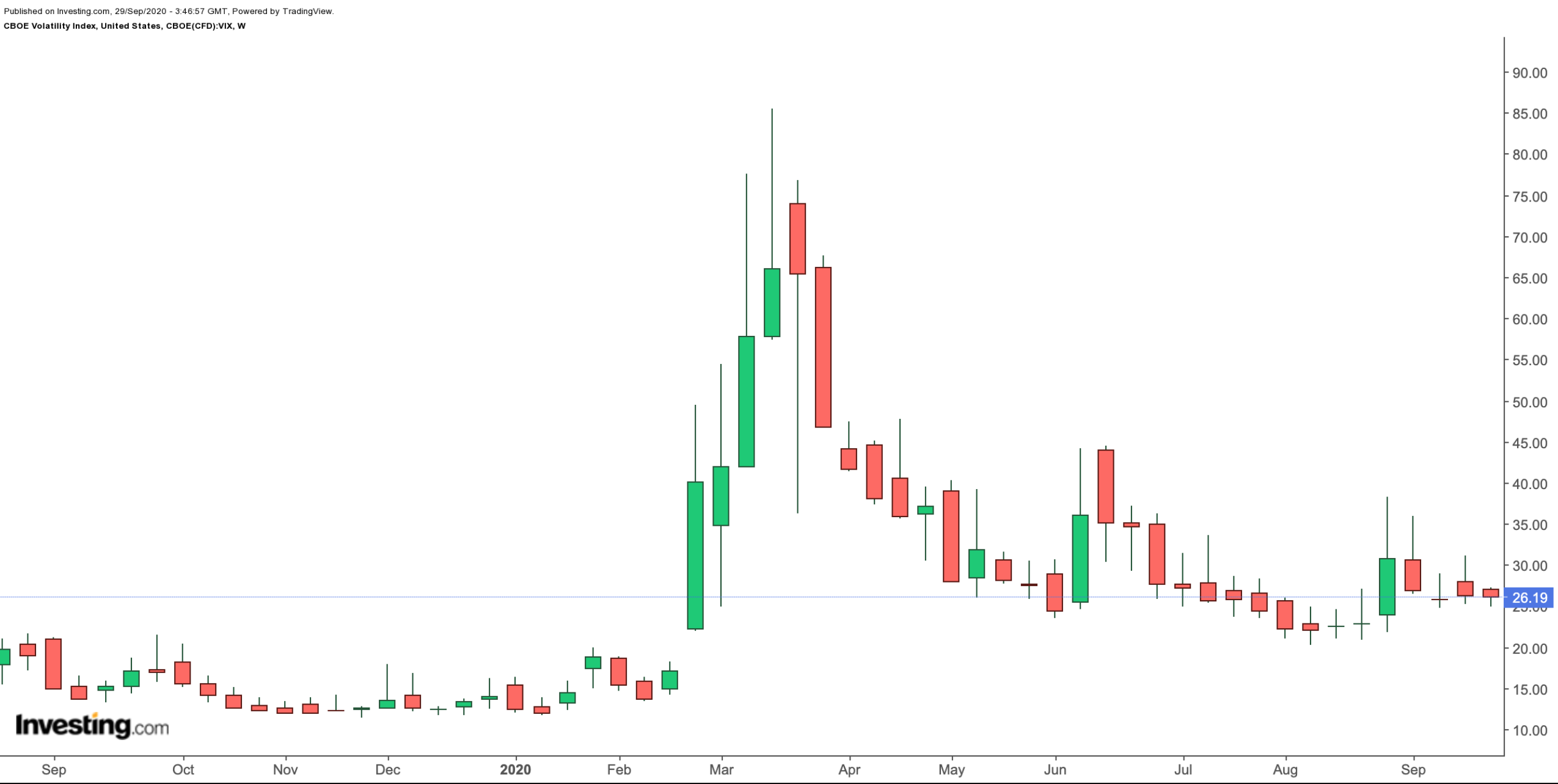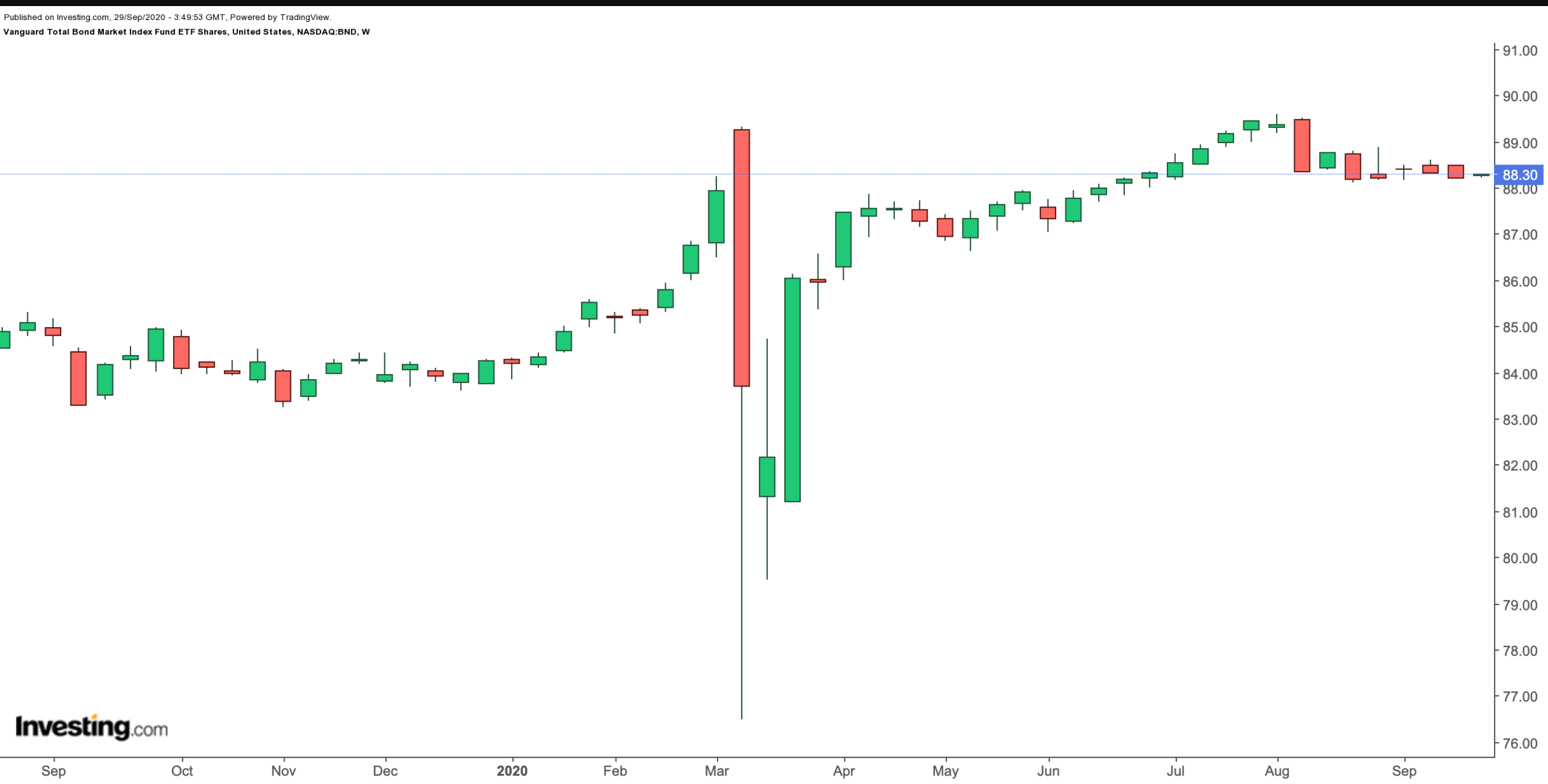Equity markets are getting ready to wrap up a volatile September. The bears have been in control of broader indices. Short-term rallies were followed by larger declines, and many Wall Street darlings went down in price during the month.

Meanwhile, traders are keeping a close eye on the CBOE Volatility Index, the premier benchmark for U.S. stock market volatility. We have previously discussed the VIX and introduced an exchange-traded note (ETN) that could be appropriate for hedging short-term volatility.
The VIX finished August at 26.41. But on Sept. 4, it hit an intraday high of 36.27, marking the highest level seen since mid-June, around the time markets took a breather. The VIX is now back at about 26.
October will possibly bring heightened volatility. First, the new earnings season is almost here. Many heavyweights will report in the second half of the month. Any potential negative guidance, downward revision or a warning by leaders could make the markets nervous.
Then comes the 2020 U.S. presidential election, scheduled for Tuesday, Nov. 3, which could mean investors may depart equities in the final quarter of the year. Several U.S.-based brokers have already increased their margin requirements, citing increased volatility ahead of the election.
Although the VIX is currently trading around 26, VIX futures are painting a more choppy picture ahead. October and November contracts are trading well above 30. As a result, we may see a move toward "safer assets" in the coming weeks. Therefore, today we'll introduce an exchange-traded fund (ETF) that may be appropriate for the weeks ahead.
Vanguard Total Bond Market ETF
Current Price: $88.30
52-Week Range: $76.49-$89.59
Dividend Yield: 2.59%
Expense Ratio: 0.035%
The Vanguard Total Bond Market Index Fund ETF (NASDAQ:BND) provides exposure to investment-grade U.S. dollar-denominated bonds with a higher weight towards U.S. Treasuries (almost 60%). Many investors regard U.S. Treasuries as the safest haven besides gold. The fund was launched in 2007. It has extremely high liquidity with close to $290 billion in assets under management.

BND tracks the Bloomberg Barclays U.S. Aggregate Float Adjusted index, which measures the performance of a wide range of fixed-income securities in the U.S. They include government, corporate and international dollar-denominated bonds, as well as mortgage-backed and asset-backed securities—all with maturities of more than one year.
U.S. Treasury and agencies are the largest issuers (41.6%), followed by government mortgage-backed security issuers (21.8%). Next on the list are industrial (17.8%) and financial (8.9%) companies, foreign government bonds (4.8) and utility sector companies (2.3%).
So far in the year, the fund is up about 6%. Financial planners highlight that in diversified portfolios, bonds may provide downside protection, an income stream as well as a reduction in volatility. Previously, we discussed how fixed income returns may differ from equity investments.
Declining interest rates have so far been positive for bond returns. And with Federal Reserve Chairman Jerome Powell signalling interest rates will remain at historic lows at least until 2023, bonds may continue to stage a strong performance.
Another important concept is duration, which is a measure of the sensitivity of bond prices to interest rate movements. For example, if a bond has a duration of three years, its price would fall about 3% when interest rates rise 1 percentage point. On the other hand, the bond's price would go up about 3% when interest rates fall by 1 percentage point.
Put another way, a high duration means a small change in interest rates could have a large effect on the value of the bond. Holding investments with a maturity of more than 20 years could become a risky proposition. BND has an average duration of 6.5 years, which means it is in the intermediate maturity category. As a result, it is less sensitive to interest rate fluctuations than funds with longer maturities. The closer a bond is to maturity, the less interest-rate risk it carries.
We believe BND may be appropriate for investors who need to take some risk off the table while still allowing for acceptable levels of returns. For example, an investor may need a certain amount of money (such as for an upcoming purchase or paying for education) in the coming years. Then a fund with a fixed-income focus may be more appropriate.
Bottom Line
Although we cannot predict how choppy markets will be in October and November, the VIX index futures are urging caution. Therefore, allocating funds into a bond portfolio could be appropriate for retail investors. But the global bond market and the range of exchange-traded funds are quite diverse.
Other funds could also be of interest in addition to the Vanguard Total Bond Market ETF. They include:
